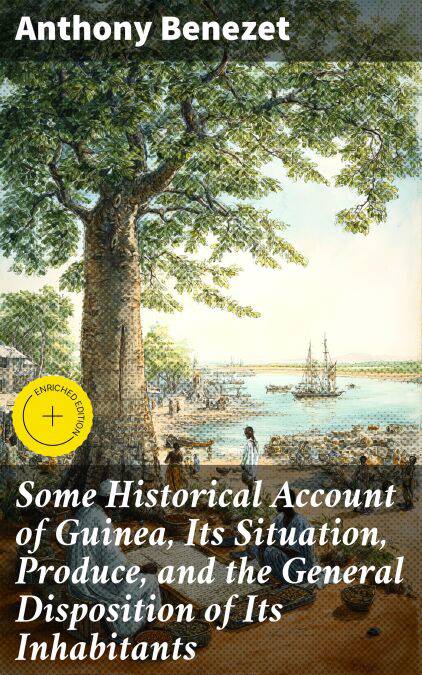
Bedankt voor het vertrouwen het afgelopen jaar! Om jou te bedanken bieden we GRATIS verzending (in België) aan op alles gedurende de hele maand januari.
- Afhalen na 1 uur in een winkel met voorraad
- In januari gratis thuislevering in België
- Ruim aanbod met 7 miljoen producten
Bedankt voor het vertrouwen het afgelopen jaar! Om jou te bedanken bieden we GRATIS verzending (in België) aan op alles gedurende de hele maand januari.
- Afhalen na 1 uur in een winkel met voorraad
- In januari gratis thuislevering in België
- Ruim aanbod met 7 miljoen producten
Zoeken
Some Historical Account of Guinea, Its Situation, Produce, and the General Disposition of Its Inhabitants E-BOOK
Enriched edition. Exploring Guinea's Past and Culture
Anthony Benezet
E-book | Engels
€ 1,99
+ 1 punten
Omschrijving
In "Some Historical Account of Guinea, Its Situation, Produce, and the General Disposition of Its Inhabitants," Anthony Benezet presents a meticulously researched exploration of West Africa during the 18th century. Utilizing empirical observations and firsthand accounts, Benezet constructs a compelling narrative that highlights the geographic, economic, and social attributes of Guinea. His literary style is marked by clarity and precision, reflecting Enlightenment ideals and a burgeoning humanitarian perspective. Contextually, the book emerges amidst the Transatlantic Slave Trade debates, urging readers to reconsider prevailing views of African societies through the lens of human dignity and cultural richness. Anthony Benezet was a groundbreaking figure in the abolitionist movement and a proponent of social justice. His Quaker background deeply influenced his moral convictions and led him to advocate against slavery and for the rights of African people. This book originated from his extensive research and interactions with enslaved individuals and traders, which not only informed his views but also fueled his unwavering commitment to humanitarianism and social reform. Readers interested in African history, abolitionist literature, or Enlightenment thought will find Benezet's work both enlightening and provocative. Benezet's advocacy for social equity and cultural appreciation invites a rethinking of historical narratives, making this book essential for scholars and laypersons alike.
In this enriched edition, we have carefully created added value for your reading experience:
- A succinct Introduction situates the work's timeless appeal and themes.
- The Synopsis outlines the central plot, highlighting key developments without spoiling critical twists.
- A detailed Historical Context immerses you in the era's events and influences that shaped the writing.
- A thorough Analysis dissects symbols, motifs, and character arcs to unearth underlying meanings.
- Reflection questions prompt you to engage personally with the work's messages, connecting them to modern life.
- Hand‐picked Memorable Quotes shine a spotlight on moments of literary brilliance.
- Interactive footnotes clarify unusual references, historical allusions, and archaic phrases for an effortless, more informed read.
In this enriched edition, we have carefully created added value for your reading experience:
- A succinct Introduction situates the work's timeless appeal and themes.
- The Synopsis outlines the central plot, highlighting key developments without spoiling critical twists.
- A detailed Historical Context immerses you in the era's events and influences that shaped the writing.
- A thorough Analysis dissects symbols, motifs, and character arcs to unearth underlying meanings.
- Reflection questions prompt you to engage personally with the work's messages, connecting them to modern life.
- Hand‐picked Memorable Quotes shine a spotlight on moments of literary brilliance.
- Interactive footnotes clarify unusual references, historical allusions, and archaic phrases for an effortless, more informed read.
Specificaties
Betrokkenen
- Auteur(s):
- Uitgeverij:
Inhoud
- Aantal bladzijden:
- 111
- Taal:
- Engels
Eigenschappen
- Productcode (EAN):
- 8596547509066
- Verschijningsdatum:
- 11/08/2023
- Uitvoering:
- E-book
- Beveiligd met:
- Digital watermarking
- Formaat:
- ePub

Alleen bij Standaard Boekhandel
+ 1 punten op je klantenkaart van Standaard Boekhandel
Beoordelingen
We publiceren alleen reviews die voldoen aan de voorwaarden voor reviews. Bekijk onze voorwaarden voor reviews.









